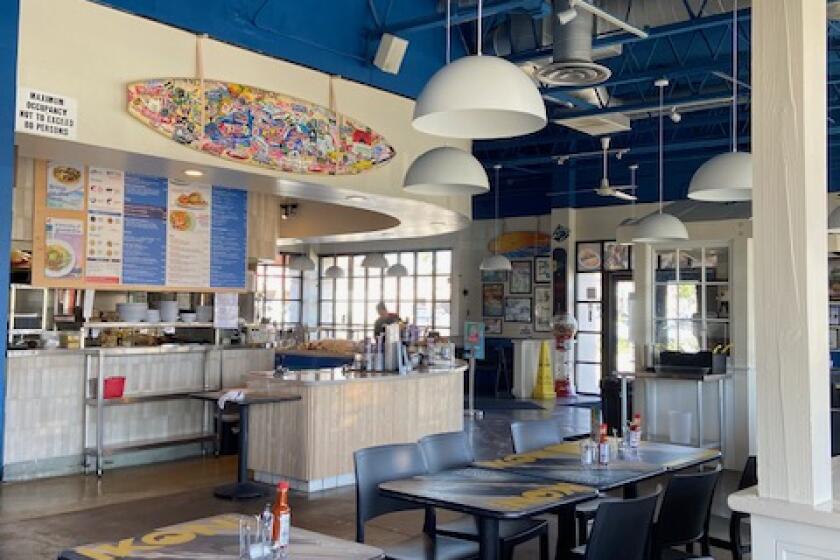Episcopalian ESL instructors teach more than English
Carol Penn stands in front of a classroom at St. Paul’s Episcopal Church in Tustin, a copy of the book, “English The American Way,” in hand.
Her lesson that Tuesday morning involves explanations of DUI — “driving under the influence” is scrawled on a white board behind her — and the ride sharing company Uber.
Penn, 72, takes a break to ask the students in her high-intermediate English as a Second Language class to go around the room and say where they’re from.
Mexico, Korea, Japan, China, Vietnam, Iran.
“And I’m from Compton,” Penn said. “Straight out of Compton!”
The students erupt with laughter.
While Penn’s international classroom bears little resemblance to the demographic makeup of St. Paul’s congregation — “We’re white, we’re female, we’re old,” said Penn — it looks just like Orange County, which has become majority-minority in recent years.
Penn agreed.
“This is Tustin,” she said.
As the county has changed, so has the programming at St. Paul’s, which offers a robust set of free ESL courses Tuesdays and Thursdays, at several language levels, to immigrants, refugees and asylum-seekers from all over the world.
“We think internationally, and we say yes to tolerance,” Penn said. “We respond to people who need our help, and they need our help now.”
Penn started St. Paul’s ESL program in 2009, after state budget cuts to education led local school districts to drop adult programming, including ESL and citizenship classes.
Penn, who had been teaching at the Tustin Unified School District’s adult school, was laid off at the end of the academic year.
“I went to my priest and said, ‘I really don’t know how I’m going to get by this,’ ” recalled Penn, who has taught ESL for nearly 20 years. “I explained to her how valuable I thought these classes were, and she said, without hesitation, ‘Bring them here.’ ”
“I thought she was crazy when she first said that, because we didn’t have any books, we didn’t even have white boards, we didn’t have supplies, and we didn’t have teachers.”
But just a few months later, in September 2009, Penn started a new ESL and citizenship program at St. Paul’s, with many of her old students in attendance.
Now the program has about 250 students per year, led by a team of 20 volunteer teachers.
Even as local school districts regained their funding for adult education last spring — and resumed ESL and citizenship classes — the program at St. Paul’s remains strong.
“They have a community, it’s not just a class,” said the Rev. Kay Sylvester, rector of St. Paul’s. “I walk by often and hear them talking about buying appliances or negotiating going to school with your kids, what does this report look like, what does this form look like? It’s really helping people be empowered to be citizens and self-determining.”
Diaa Diwan, who came to the United States three years ago as a refugee from Syria, said that St. Paul’s ESL classes have been “like the sunlight” for her.
“Carol was not only teaching us English, she was telling us how to live here in the United States,” the 36-year-old mother of two said. “It’s not easy for us. It’s a new language, it’s a new life. Everything is new for us.”
On top of weekly English lessons, Diwan said that Penn helped her family get driver’s licenses, jobs and, eventually, green cards.
Now Diwan is enrolled in Moreno Valley College, where she plans to study early childhood education. Her family also purchased their first home in the area.
A current student in Penn’s high-intermediate class is a 21-year-old Iranian asylum seeker who studied English literature before coming to the United States in 2015 and cites “Death of a Salesman” as her favorite play.
“When I went to that ESL class I wasn’t OK, I was totally depressed,” said the student, who asked that her name not be used because of her immigration status. “I felt it was the end of the world, I am here alone, I am far away from my family, my family is also in danger because of me. I haven’t any place to go.”
“As an asylum-seeker, life is very hard,” she went on. “It takes a year to get your legal documents, such as Social Security number and employment authorization. Still I’m applying for jobs. Those ESL classes are a center of hope for us.”
Sylvester said the classes enrich St. Paul’s congregation.
“Episcopalians tend to, still, demographically be skewing towards white and economically advantaged,” she said. “One of the things the program does is it brings people on our campus who don’t look like traditional Episcopalians, in the very best sense — because we can actually see who our neighbors are.”
“The fact that we have an ESL program has raised some awareness about what folks are facing in places like Syria, so there’s less fear and more of a sense of we know what folks are up against, which makes us a better bridge to reaching out.”
But this year, Penn said the dynamics in many classrooms have changed.
“Our attendance at ESL of Muslim students dropped dramatically,” she said. “If they don’t feel safe here, then they don’t feel safe. It is a Christian church. That’s never been a problem before, but it might be a problem now.”
Said Sylvester: “When the first executive order came down, shutting the borders, as it were, to people from several nations, I went into the class and said very clearly, ‘This has no effect on our relationship with you. We want to be your friends, we want to be your allies. That’s who we’re called to be.’ ”
Barring immigrants and refugees from education — whether through fear of U.S. immigration policies or cuts to funding —harms everyone, Penn said.
“Throwing up these kinds of roadblocks I really don’t think is benefiting this country,” she said. “These people have talents, they have education, they have gifts to give, and we’re setting up obstacles for them to use their gifts. That doesn’t make any sense to me.
“Why would we lock them out?”
Caitlin Yoshiko Kandil is a contributor to Times Community News.
All the latest on Orange County from Orange County.
Get our free TimesOC newsletter.
You may occasionally receive promotional content from the Daily Pilot.




